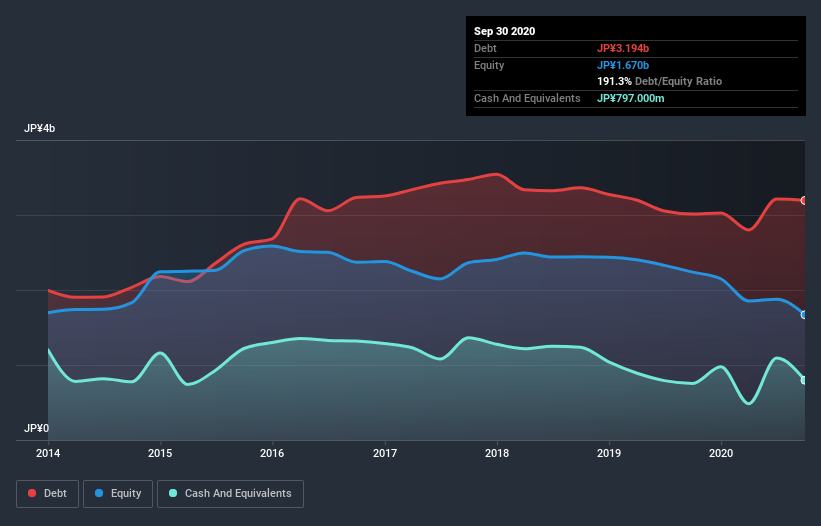Warren Buffett famously said, 'Volatility is far from synonymous with risk.' So it might be obvious that you need to consider debt, when you think about how risky any given stock is, because too much debt can sink a company. We can see that Nihon Seimitsu Co., Ltd. (TYO:7771) does use debt in its business. But should shareholders be worried about its use of debt?
When Is Debt A Problem?
Debt assists a business until the business has trouble paying it off, either with new capital or with free cash flow. Ultimately, if the company can't fulfill its legal obligations to repay debt, shareholders could walk away with nothing. However, a more usual (but still expensive) situation is where a company must dilute shareholders at a cheap share price simply to get debt under control. Of course, plenty of companies use debt to fund growth, without any negative consequences. When we think about a company's use of debt, we first look at cash and debt together.
See our latest analysis for Nihon Seimitsu
How Much Debt Does Nihon Seimitsu Carry?
As you can see below, at the end of September 2020, Nihon Seimitsu had JP¥3.19b of debt, up from JP¥3.01b a year ago. Click the image for more detail. However, it does have JP¥797.0m in cash offsetting this, leading to net debt of about JP¥2.40b.

A Look At Nihon Seimitsu's Liabilities
According to the last reported balance sheet, Nihon Seimitsu had liabilities of JP¥2.86b due within 12 months, and liabilities of JP¥1.07b due beyond 12 months. On the other hand, it had cash of JP¥797.0m and JP¥538.0m worth of receivables due within a year. So its liabilities outweigh the sum of its cash and (near-term) receivables by JP¥2.60b.
The deficiency here weighs heavily on the JP¥1.56b company itself, as if a child were struggling under the weight of an enormous back-pack full of books, his sports gear, and a trumpet. So we definitely think shareholders need to watch this one closely. After all, Nihon Seimitsu would likely require a major re-capitalisation if it had to pay its creditors today. There's no doubt that we learn most about debt from the balance sheet. But you can't view debt in total isolation; since Nihon Seimitsu will need earnings to service that debt. So when considering debt, it's definitely worth looking at the earnings trend. Click here for an interactive snapshot.
Over 12 months, Nihon Seimitsu made a loss at the EBIT level, and saw its revenue drop to JP¥5.2b, which is a fall of 29%. That makes us nervous, to say the least.
Caveat Emptor
Not only did Nihon Seimitsu's revenue slip over the last twelve months, but it also produced negative earnings before interest and tax (EBIT). Its EBIT loss was a whopping JP¥450m. Considering that alongside the liabilities mentioned above make us nervous about the company. It would need to improve its operations quickly for us to be interested in it. Not least because it had negative free cash flow of JP¥321m over the last twelve months. So suffice it to say we consider the stock to be risky. There's no doubt that we learn most about debt from the balance sheet. But ultimately, every company can contain risks that exist outside of the balance sheet. Case in point: We've spotted 4 warning signs for Nihon Seimitsu you should be aware of, and 1 of them shouldn't be ignored.
If, after all that, you're more interested in a fast growing company with a rock-solid balance sheet, then check out our list of net cash growth stocks without delay.
When trading Nihon Seimitsu or any other investment, use the platform considered by many to be the Professional's Gateway to the Worlds Market, Interactive Brokers. You get the lowest-cost* trading on stocks, options, futures, forex, bonds and funds worldwide from a single integrated account. Promoted
Valuation is complex, but we're here to simplify it.
Discover if Nihon Seimitsu might be undervalued or overvalued with our detailed analysis, featuring fair value estimates, potential risks, dividends, insider trades, and its financial condition.
Access Free AnalysisThis article by Simply Wall St is general in nature. It does not constitute a recommendation to buy or sell any stock, and does not take account of your objectives, or your financial situation. We aim to bring you long-term focused analysis driven by fundamental data. Note that our analysis may not factor in the latest price-sensitive company announcements or qualitative material. Simply Wall St has no position in any stocks mentioned.
*Interactive Brokers Rated Lowest Cost Broker by StockBrokers.com Annual Online Review 2020
Have feedback on this article? Concerned about the content? Get in touch with us directly. Alternatively, email editorial-team (at) simplywallst.com.
About TSE:7771
Nihon Seimitsu
Manufactures and sells watch bands and exterior parts, spectacle frames, and other products in Japan.
Adequate balance sheet and fair value.
Market Insights
Community Narratives



